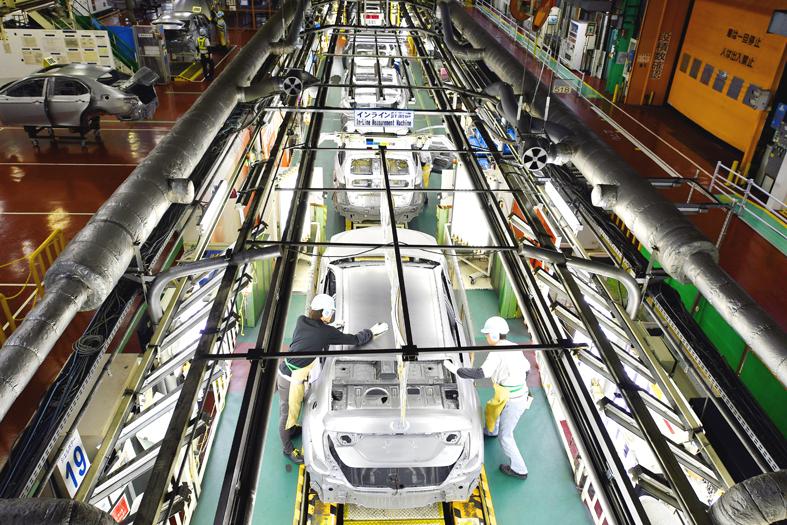Toyota Motor Corp was to resume work at all its Japanese factories today after a one-day shutdown, limiting the fallout from a cyberattack on one of its key suppliers.
The world’s top auto producer was to resume operations at all 14 plants in its home country, Toyota said in a statement yesterday.
It had halted production at the plants due to impacts from a cyberattack against parts supplier Kojima Press Industry Co.

Photo: EPA-EFE
Kojima Press yesterday confirmed that its server was subject to a cyberattack over the weekend.
It subsequently shut down the server and is aiming to restore its system from today, a spokesperson for the company said late on Monday.
A spokeswoman for Toyota yesterday said that it would take a week or two for the company to sort out the Kojima Press hack.
In the meantime, Toyota is using a workaround to get operations back up and running, she said.
Toyota’s Japan production stoppage — although short in length — is a setback in the automaker’s efforts to recover production lost in the past few months to chip shortages and COVID-19-related disruptions. The supply snags last month prompted Toyota to cut its output goal for the fiscal year through this month to 8.5 million vehicles, from a previous target of 9 million.
The one-day domestic production stoppage likely affected about 13,000 vehicles’ worth of production, representing about 5 percent of output for the month of February.
Toyota had planned to produce 950,000 vehicles this month, up from the 843,393 it produced a year earlier.
In that sense, it would be difficult for Toyota to increase production further to make up for units lost due to supplier network disruptions, Bloomberg Intelligence analyst Tatsuo Yoshida said.
Still, the number of units lost to the recent network disturbances remains “very small” relative to Toyota’s total annual output and the amount it lost last year when the spread of COVID-19 in Southeast Asia caused it to slash production, Yoshida said.
Toyota should be able to recover recent losses next month or in May, he added.
Kojima Press derives most of its sales from the Toyota Group, so there is also likely to be little impact from the cyberattack on other Japanese automakers, including Honda Motor Co and Nissan Motor Co, Mitsubishi UFJ Morgan Stanley Securities Co said in a report.
That said, the events illustrate that “strengthening cybersecurity measures for the entirety of supply chains will be an urgent task for the entire auto industry,” the report said.

The New Taiwan dollar is on the verge of overtaking the yuan as Asia’s best carry-trade target given its lower risk of interest-rate and currency volatility. A strategy of borrowing the New Taiwan dollar to invest in higher-yielding alternatives has generated the second-highest return over the past month among Asian currencies behind the yuan, based on the Sharpe ratio that measures risk-adjusted relative returns. The New Taiwan dollar may soon replace its Chinese peer as the region’s favored carry trade tool, analysts say, citing Beijing’s efforts to support the yuan that can create wild swings in borrowing costs. In contrast,

Nvidia Corp’s demand for advanced packaging from Taiwan Semiconductor Manufacturing Co (TSMC, 台積電) remains strong though the kind of technology it needs is changing, Nvidia CEO Jensen Huang (黃仁勳) said yesterday, after he was asked whether the company was cutting orders. Nvidia’s most advanced artificial intelligence (AI) chip, Blackwell, consists of multiple chips glued together using a complex chip-on-wafer-on-substrate (CoWoS) advanced packaging technology offered by TSMC, Nvidia’s main contract chipmaker. “As we move into Blackwell, we will use largely CoWoS-L. Of course, we’re still manufacturing Hopper, and Hopper will use CowoS-S. We will also transition the CoWoS-S capacity to CoWos-L,” Huang said

Nvidia Corp CEO Jensen Huang (黃仁勳) is expected to miss the inauguration of US president-elect Donald Trump on Monday, bucking a trend among high-profile US technology leaders. Huang is visiting East Asia this week, as he typically does around the time of the Lunar New Year, a person familiar with the situation said. He has never previously attended a US presidential inauguration, said the person, who asked not to be identified, because the plans have not been announced. That makes Nvidia an exception among the most valuable technology companies, most of which are sending cofounders or CEOs to the event. That includes

INDUSTRY LEADER: TSMC aims to continue outperforming the industry’s growth and makes 2025 another strong growth year, chairman and CEO C.C. Wei says Taiwan Semiconductor Manufacturing Co (TSMC, 台積電), a major chip supplier to Nvidia Corp and Apple Inc, yesterday said it aims to grow revenue by about 25 percent this year, driven by robust demand for artificial intelligence (AI) chips. That means TSMC would continue to outpace the foundry industry’s 10 percent annual growth this year based on the chipmaker’s estimate. The chipmaker expects revenue from AI-related chips to double this year, extending a three-fold increase last year. The growth would quicken over the next five years at a compound annual growth rate of 45 percent, fueled by strong demand for the high-performance computing